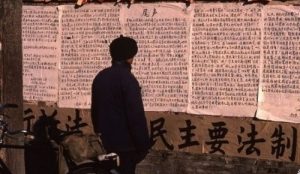Friday, April 28, 3:00 – 5:00 p.m. in CEAS 319 (1155 E. 60th St.)
Daniela Licandro, “Clumsy Democracy, Clumsy Jiantao: The Construction of a Collective Identity in Wei Junyi’s Recollections of Pain“
Please join us this Friday as we host Daniela Licandro (PhD Candidate, EALC). Daniela will present a draft of one of her dissertation chapters, which she summarizes as follows:
This chapter explores the intersection of personal and collective memory in Wei Junyi’s (韦君宜1917-2002) understudied memoir, Recollections of Pain (Si tong lu思痛录, 1998). Written between 1976 and 1989, Wei’s text stands out in the sea of post-Mao memoirs that have tried to come to terms with the sufferings of the revolutionary era. The effort to critically reflect on the past, personal and collective, ensures Wei’s memoir a place in the large body of “literature of reflection” (fansi wenxue反思文学). The chapter engages with the “reflective” agenda of the text and asks how reflection operates, what its models are, and how it relates to the collective identity constructed in the text. I argue that self-criticism (jiantao 检讨)—the socialist practice of self-analysis meant to identify one’s mistakes and reform oneself—provides Wei Junyi with an important model to examine the past. The logic of self-criticism is summarized by the formula “unity-struggle-unity.” Wei’s memoir, in its entirety, re-enacts the formula. On trial is her and other people’s deviation from the original project of eliminating privileges and building a democracy. In the “self-criticism” Wei carries out the “self” is however not simply the individual self but a collective self. It is this collective identity that allows Wei to intertwine, in the memoir, the widely felt urgency to reflect on the past with contemporary debates on democracy. My study of the intersection of personal and collective identity in Recollections of Pain shows how collective narratives did not disappear immediately after the end of the revolutionary period. Moreover, reading Wei’s memoir from the perspective of how it recuperates and/or departs from the rhetoric and structure of jiantao allows a better understanding not only of the place of self-criticism within the broader context of cultural and literary practices, but also of its relation to the way literature was imagined, desired, and pursued.
The paper is available directly below, or at this link. If you have not received the password, or have questions about accessibility, please feel free to contact Alex Murphy at murphya1@uchicago.edu.
